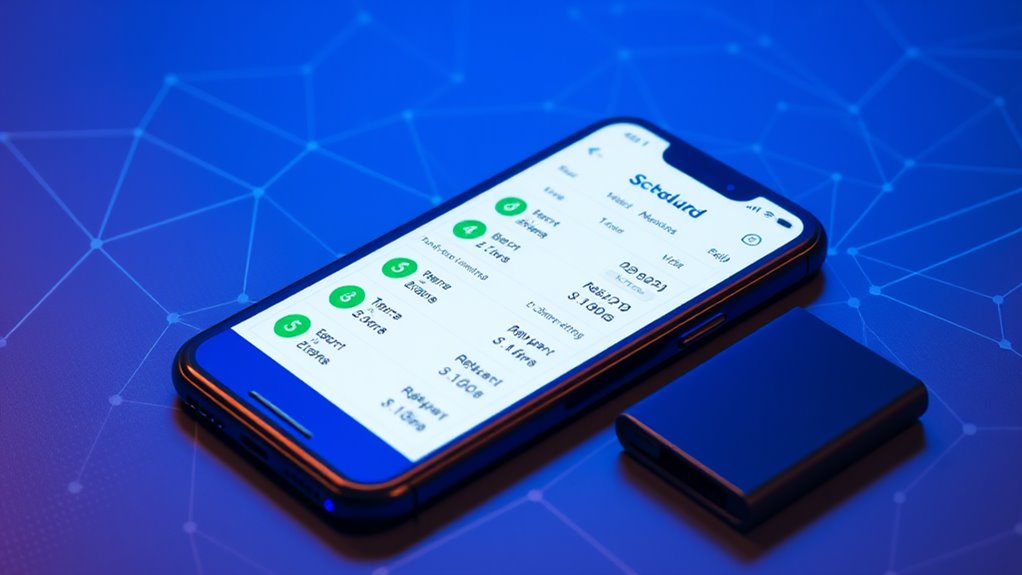Recurring Payments in Cryptocurrency
Note: This post may contain affiliate links, and we may earn a commission (with No additional cost for you) if you make a purchase via our link. See our disclosure for more info. The crypto world is constantly changing. This content is for informational purposes only and not financial, legal, or professional advice So, please verify the info on the cryptocurrency provider’s websites.
Recurring payments in cryptocurrency make life easier. They automate transactions, so no more double-checking those pesky subscriptions or donations. Who wants to authorize payments every month anyway? They're great for businesses too, ensuring cash flow is steady. Plus, with added perks like decentralization and lower fees, it's a win-win. Even if the crypto market is a wild ride, platforms offer tools to help manage volatility. Curious about what else makes these payments unique? Stick around.

In a world where forgetting monthly bills is as common as scrolling through social media, recurring payments in cryptocurrency are here to save the day—or at least your sanity. Gone are the days of frantic searches for your credit card while trying to remember if you already paid for that streaming service.
Enter recurring crypto payments. They automate transactions at set intervals using Bitcoin or Ethereum, so you don't have to lift a finger. These payments eliminate the need for manual authorization. Think subscriptions, donations, or rental agreements—no more last-minute panic. Transactions are recorded on the blockchain, meaning everything is transparent and auditable. It's like having a financial diary that can't be tampered with. Additionally, recurring payments streamline billing processes, ensuring timely payments for businesses.
Recurring crypto payments automate transactions with Bitcoin or Ethereum, eliminating manual authorization and ensuring transparency on the blockchain.
Sure, they're similar to traditional recurring payments, but they exist in a decentralized, bank-free environment. No banks, no fees, just you and your crypto. Businesses love these payment solutions. They streamline billing for services like VPNs and memberships. Why deal with the hassle of traditional banking systems when you can operate in a decentralized world? Especially in places where the financial infrastructure is shakier than a toddler on roller skates.
The benefits? Oh, they just keep coming. Decentralization means more control for users. You can cancel or modify payments whenever you want. And let's talk about cost efficiency—lower fees than traditional systems. That's a win-win. Additionally, greater control and transparency with transactions recorded on the blockchain enhances tracking and verification, making it easier for users to manage their finances. For optimal security, enabling two-factor authentication on your cryptocurrency platforms can protect your recurring payment accounts from unauthorized access.
Platforms like UPay, Binance, and BitPay make it easy. They offer user-friendly interfaces and diverse options for recurring purchases. But wait—what about volatility? Crypto can be a wild ride. Stablecoins like USDT can keep your payments steady. Plus, many platforms provide tools to adjust payment amounts based on market changes.
Frequently Asked Questions
Can I Set up Recurring Payments in Multiple Cryptocurrencies?
Setting up recurring payments in multiple cryptocurrencies? It's not a walk in the park, but it's doable.
Some platforms let you invoice in various coins, while others focus on just a few. Smart contracts and crypto wallets are often required, so prepare for some techy stuff.
Oh, and watch out for volatility—stablecoins can save your bacon here. Just remember to double-check everything; mistakes with crypto can be costly.
Are There Any Fees Associated With Recurring Cryptocurrency Payments?
Fees? Oh yeah, they exist. Most platforms hit you with a percentage for transactions, usually around 1%.
If you're a big player, maybe you'll snag a discount. Use stablecoins? You might pay less.
But watch out for those sneaky gas fees! No hidden charges? Sure, if you ignore the volatility risk.
Bottom line: fees are lower than credit cards, but crypto comes with its own chaotic baggage. Welcome to the future!
How Secure Are Recurring Payments in Cryptocurrency?
Security in cryptocurrency transactions? It's a mixed bag.
Sure, encryption and blockchain tech sound great, but hackers love a challenge. Smart contracts can automate payments, which is cool until they malfunction.
Hardware wallets? They're like vaults, but nothing's foolproof. Transparency is nice, but the pseudonymous nature can be a double-edged sword.
What Happens if My Wallet Runs Out of Funds?
When a wallet runs dry, chaos reigns. Transactions fail. Services cut off.
Imagine the horror of losing access to your funds. Smart contracts? Yeah, they just stop. Fees? They pile up, making things worse.
And good luck with those network fees—totally unpredictable. Your funds might be scattered across wallets like confetti. It's a mess.
Can I Cancel a Recurring Payment at Any Time?
Absolutely, one can cancel a recurring payment at any time.
However, it's not as easy as just clicking a button. Each platform has its own quirky process, and guess what? You usually have to confirm your decision.
Surprise! Cancellations stop future payments but don't magically refund past ones.










